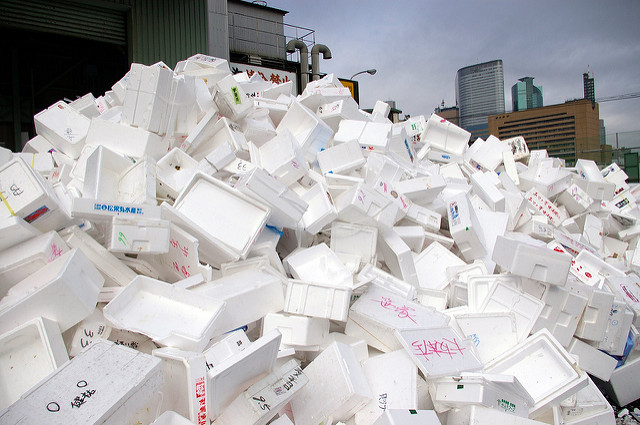
OVERVIEW
MANAGEMENT
PERFORMANCE
POSSIBILITIES
CAPITALS
ACTIVITIES
ACTORS
BURGESS
Product |
|
Burgess COMMENTARY |
|
Packaging Industry Awards Grants for Polystyrene Recycling
Polystyrene has long been one of the more controversial materials in the nationwide and global recycling debate. Invented 75 years ago, it is lightweight and convenient, keeps food hot or cold, and helps ensure that shipped goods remain intact. But despite the packaging industry’s insistence that polystyrene can be recycled and that such a market is growing, many municipalities do not include it amongst other accepted recyclables such as glass, metal and plastic. Some cities and towns have banned its use. New York City led the most prominent effort, only to have packaging companies let by Dart Container Corp. fight its law, a battle they eventually won in court. Meanwhile cities across the country struggle with the polystyrene recycling question, and often spend a lot of time educating their residents that nope, those clamshell to-go containers and Styrofoam cups are not recyclable and pose their fair share of environmental problems. But the food packaging industry has realized that, in order to avoid more bans, it has to provide an alternative during an era when many cities and towns are confronting diminished landfill space — and no one wants a municipal dump in their backyard. One such trade group, the Food Service Packaging Institute (FPI), has launched another grant application cycle for organizations committed to launch or expand a post-consumer polystyrene recycling program. The two-year-old Foam Recycling Coalition is accepting applications until April 10. In addition to the FPI, other organizations participating in this initiative include Chick-fil-A, the aforementioned Dart Container, Shell Chemical and TOTAL Petrochemicals. Awards will range from $15,000 to $25,000, winners of the grant will have to commit to collecting polystyrene for at least three years and finally, they are required to report the total volume of polystyrene collected to the FPI. While the grant applications do not explicitly require a “densifier,” a machine that is necessary to compact polystyrene as the material is about 90 percent air, awardees are strongly encouraged to invest in such equipment. While the polystyrene debate rages on, more companies have switched to different packaging materials to show that they are more environmentally responsible and proactive on waste-diversion efforts. Computer manufacturer Dell, for example, has experimented with a bevy of alternatives to polystyrene, including one that is a combination of agricultural waste and fungus. Ikea also claims it will transition away from polystyrene and instead incorporate a similar ag waste and mushroom-based material that is compostable. Meanwhile more “green” and recycling experts tout alternatives to polystyrene and its cousin, plastic, but many of them are not scalable or present their own set of challenges. Polystyrene is lightweight yet is bulky and requires a huge amount of space — it is not as lucrative to collect, reprocess and sell as glass, aluminum, or even cardboard. The problem food packaging companies face is that this supposed market for recycled polystyrene just is not there. Few companies tout that their product is using recycled polystyrene; it just does not resonate as well as “this shirt is made out of 15 recycled PET bottles” or “plant based plastic.” And recycling those massive Styrofoam inserts into “green” peanuts does not solve this riddle, as most likely they will end up in the local landfill. In the meantime, watch for companies to follow the sustainable packaging lead of Dell and Ikea as more consumers simply would prefer not to deal with polystyrene at all. Image credit: David Gilford (Flickr) Based in Fresno, California, Leon Kaye is a business writer and strategic communications specialist. He has also been featured in The Guardian, Sustainable Brands and CleanTechnica. When he has time, he shares his thoughts on his own site, GreenGoPost.com. Contact him at leon@greengopost.com. You can also reach out via Twitter (@LeonKaye) and Instagram (GreenGoPost). FOLLOW LEON KAYE @LEONKAYE |
|
by Leon Kaye on Monday,
Mar 7th, 2016 |
| The text being discussed is available at http://www.triplepundit.com/2016/03/packaging-industry-awarding-grants-polystyrene-recycling/ and |
